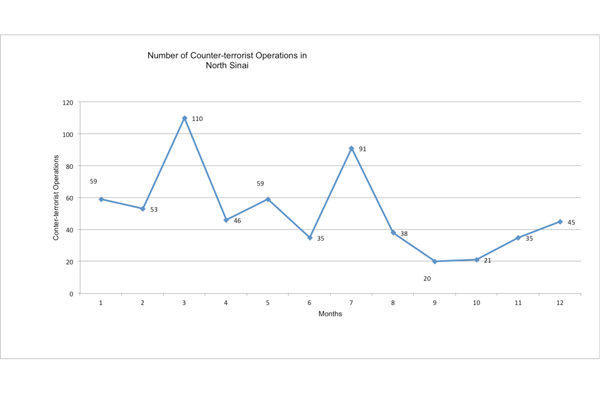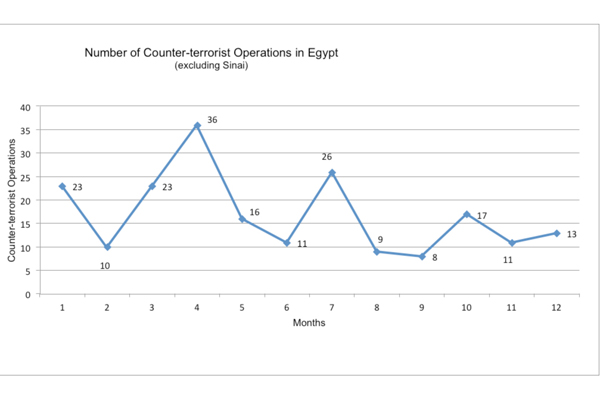When analysing the outcome of counter-terrorism policies in 2017, many think tanks in the West and terrorism scholars in Egypt focus only on security while ignoring other aspects of anti-terrorism policies. The conclusion, therefore, is that terrorism is combated through “militarisation” and “security measures”.
Terrorism literature specifies three main domains of anti-terrorism policies. First, engaging with terrorist elements directly; second, dealing with terrorism victims; third, preventing the spread of terrorism through inoculating society through effective counter-terrorism programmes.
When applying these three domains to Egypt’s anti-terrorism policies, we find there is real non-military and non-security work being done, but that it needs improvement. It is important to take these three factors into consideration when analysing last year’s efforts to combat terrorism.
In the first domain, last year saw more raids and combat operations by security forces that led to pre-emptive attacks being planned by terrorist cells. Security agencies succeeded in dismantling terrorist cells focused on recruiting new members, such as Amr Saad cell, while continuing the state of emergency in North Sinai, engaging more air strikes targeting terrorists, and prosecuting more terrorist cases in court.
Also, the Supreme Council for Combating Terrorism was formed in July 2017, which in theory is a step in the right direction since this is a body that would at least coordinate efforts to combat terrorism, extremism and decide on a national strategy.
In the second domain, the government continued to pay monetary compensation to victims on a case-by-case basis.
For example, after the attack on Al-Rawda Mosque in Beir Abd, President Abdel-Fattah Al-Sisi ordered payment of LE200,000 to the families of each of those killed, and LE50,000 to each injured victim. The Ministry of Education also waived the fees at government schools for the children of those killed, and a decision was taken to prioritise hiring the offspring of martyrs in government offices.
There are some serious shortcomings in defining who is a victim because the 2015 anti-terrorism law does not have an exact definition or compensation clauses for victims. The draft law on victims of terrorism has not yet been ratified by parliament.
In the third domain, inoculating society against extremism, which mostly focuses on addressing the causes of terrorism, existing efforts continue to deal with religious extremism as the main feature of the radicalism responsible for terrorist attacks. But this ignores the political and social dimensions of terrorism in most cases.
Efforts in this domain remain dispersed among various state institutions without a coordinating body. Combating radical ideology on the Internet is a good example because it is necessary for these efforts to be comprehensive and develop suitable messages to reach Internet users who are being targeted by terrorists.
Although the state invested in non-security policies to combat terrorism, this does not mean they were effective. It is indicative, however, that progress was made in how it views counter-terrorism, which is worthy of praise and development, especially since these policies were adopted at a time when terrorists planned and carried out substantial attacks last year.

Number of Counter-terrorist operations -North Sinai in 2017

Number of Counter-terrorist operations in Egypt in 2017 (excluding-North Sinai)
Regarding developing counter-terrorism policies this year, I recommend the following:
- Activating the Supreme Council for Combating Extremism and Terrorism, and adding experts and academics in the field to its board and general secretariat when it is formed.
- Quickly adopting and applying legislation for terrorism victims in partnership with civil society institutions.
- Encouraging think tanks to conduct research on terrorism and extremism since the contribution of research centres on this subject remains limited.
- Focusing on building the abilities of individual citizens, since they are the primary partner in counter-terrorism efforts, through raising awareness on what to do if they are at a location of a terrorist attack, how to administer first aid to those injured, and what to do before and after a terrorist attack.
* Eman Ragab is a senior researcher in Security Studies at Al-Ahram Centre For Political and Statrategic Studies
* This article was first published in December 2017 Al-Ahram Weekly
Short link: